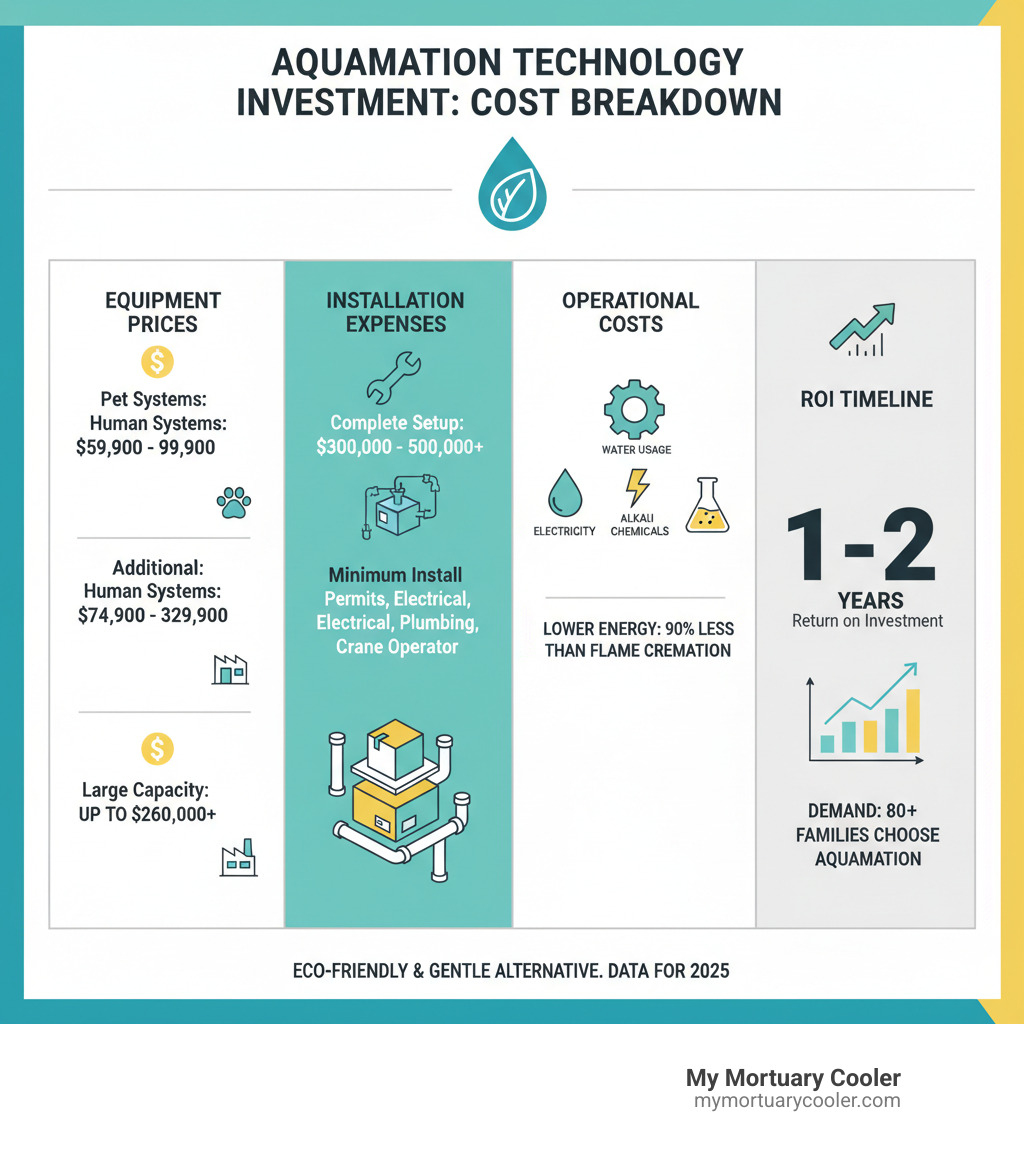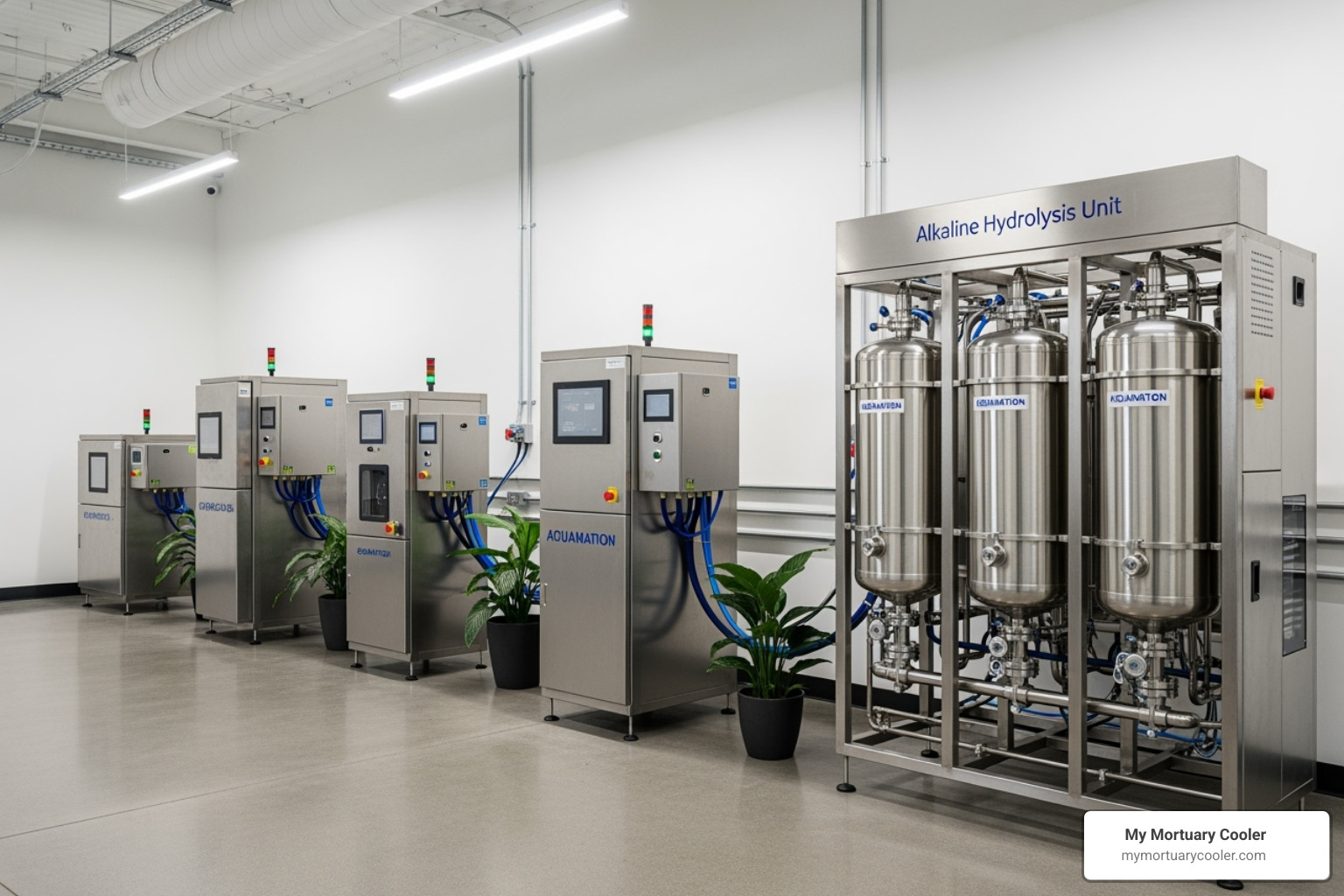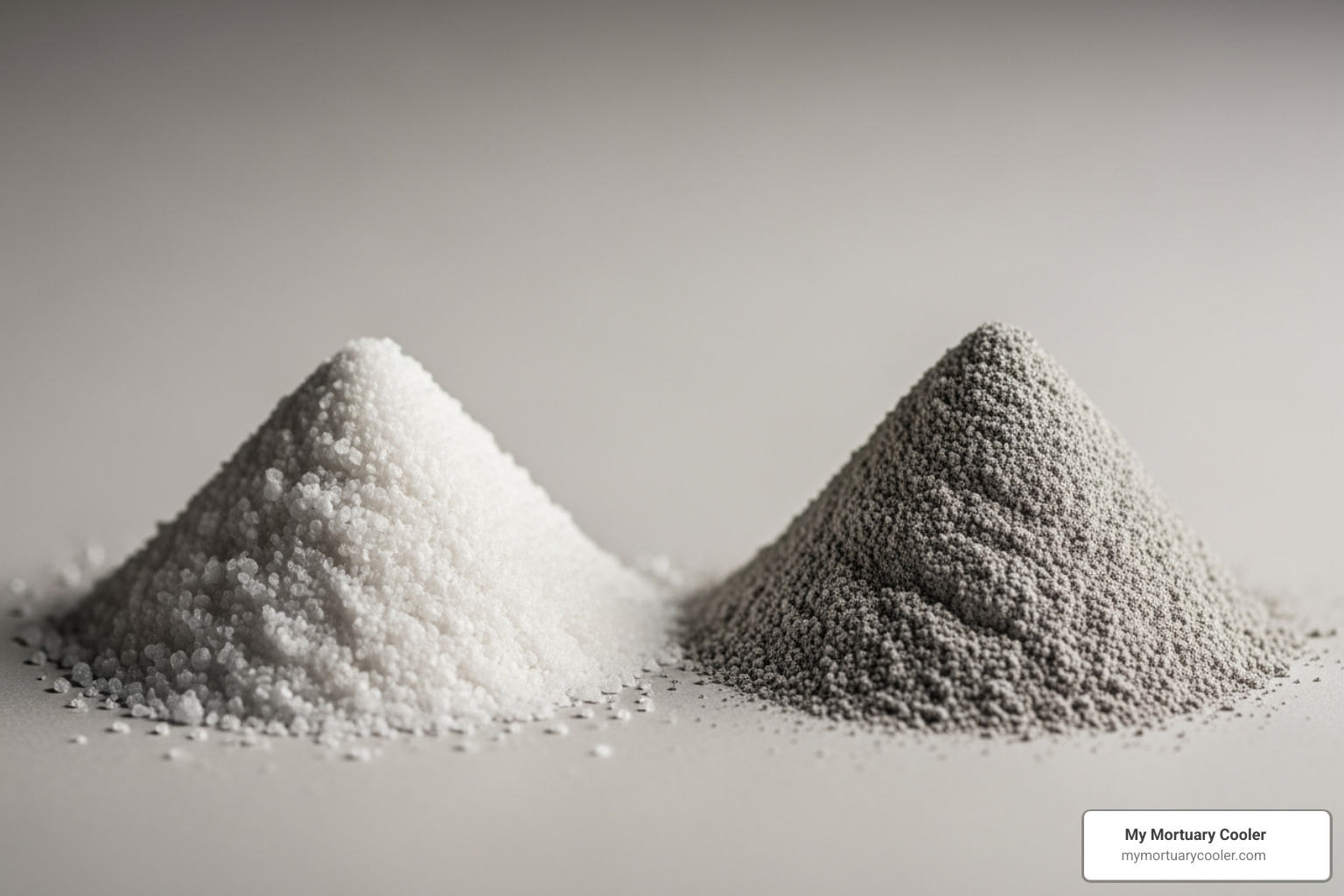Understanding the Investment in Alkaline Hydrolysis Technology
The alkaline hydrolysis machine cost represents a significant but potentially profitable investment for funeral homes looking to offer eco-friendly disposition services. Based on industry data, here's what you need to know:
Machine Costs:
- Pet systems: $59,900 - $99,900
- Human systems: $174,900 - $329,900
- Large capacity units: Up to $260,000+
Total Investment (including installation):
- Complete setup: $300,000 - $500,000
- Installation costs: $10,000 minimum
- Additional expenses: Permits, electrical, plumbing, crane operator
As John Garretson, whose family chose aquamation after a tragic loss, put it: "The thought of cremating their son in the conventional way was almost as excruciating as the memory of his death." This sentiment reflects growing consumer demand for gentler, more environmentally conscious alternatives to flame cremation.
Alkaline hydrolysis, also known as aquamation or water cremation, uses water and alkali instead of fire to break down remains. The process uses 90% less energy than traditional cremation and produces no harmful emissions. For funeral directors, this technology offers a chance to meet changing consumer preferences while potentially improving profit margins.
The high upfront cost might seem daunting, but many funeral homes report return on investment within 1-2 years. With over 80% of families choosing aquamation when offered the option, the demand clearly exists.
Understanding these costs - both initial and ongoing - is crucial for making an informed decision about whether aquamation fits your business model and budget.

What is Alkaline Hydrolysis and Why is it Gaining Popularity?
You might be wondering what exactly alkaline hydrolysis is and why funeral homes across the country are suddenly talking about it. The answer lies in a fascinating process that's both surprisingly old and refreshingly modern.
Alkaline hydrolysis - also called aquamation or water cremation - is essentially nature's own decomposition process, just faster and more controlled. Instead of fire, this gentle method uses warm water mixed with an alkali solution to break down the body's soft tissues. Think of it as accelerating what would naturally happen over many years in just a few hours.
Here's how it works: The deceased is placed in a stainless steel chamber filled with water and potassium hydroxide (the alkali). The mixture is heated to around 200-300°F under pressure. Over 3-16 hours, depending on the system, the combination of water, heat, and alkalinity gently dissolves the soft tissues, leaving behind clean bone fragments and a sterile liquid.
What surprises many people is that the process was first developed in 1888 - long before modern cremation became popular. It was originally used for medical research and later to safely dispose of livestock during disease outbreaks. Only recently has it gained acceptance for human disposition.
The environmental benefits are impressive. Unlike flame cremation, aquamation produces no toxic emissions and uses about 90% less energy. There's no burning of fossil fuels, no mercury released from dental fillings, and no worries about pacemaker explosions. The process has a dramatically reduced carbon footprint compared to traditional methods.
But it's not just about being green. Families are drawn to what many describe as a more gentle process. There's something comforting about water-based disposition that feels less harsh than fire. As we discuss in our article Exploring Aquamation: The Future of Funerals, this emotional appeal is driving much of the current interest.
Consumer demand for green options is growing rapidly. When given the choice, studies show that 80% of families choose aquamation over traditional cremation. People want their final act to align with their environmental values, and aquamation offers that peace of mind.
For funeral directors considering the alkaline hydrolysis machine cost, this growing demand represents a significant business opportunity. The technology isn't just trendy - it's becoming essential for staying competitive in an evolving market where families increasingly seek eco-friendly alternatives.
The shift toward aquamation reflects broader changes in how we think about death and environmental responsibility. It's no longer just about offering a service - it's about providing options that honor both the deceased and the planet they're leaving behind.
Breaking Down the Alkaline Hydrolysis Machine Cost
For funeral home owners, understanding the alkaline hydrolysis machine cost is about more than the machine's price tag. It's a broad investment that includes installation, permits, and site work. While a significant commitment, it offers new services and a unique way to stand out in the market. The following figures are estimates and can vary by manufacturer, features, and location, but they provide a solid basis for financial planning. For a deeper dive into the process, see our guide: Hydro Cremation Explained: A New Era in Farewell.

Upfront Equipment Investment: Price Ranges
The machine itself is the core of the alkaline hydrolysis machine cost. Units vary in size and price, from pet systems to human disposition models.
- Pet Systems: For pet aftercare, a PET-100 system (up to 100lbs) starts around $59,900. A PET-400 (up to 400lbs) is about $84,900, and a PET-550 (up to 550lbs) is near $99,900. Many designs allow for processing multiple pets individually at once.
- Human Systems: For human disposition, machines and costs scale up. A basic Low-Temp (LT-500) model (up to 500lbs) starts around $174,900. A faster High-Temp (HT-500) system could be $254,900. Other sources price a basic unit at $209,900, with advanced models up to $329,900. These prices typically exclude shipping, training, and installation.
- Large Capacity Systems: For high-volume facilities or large animals, stationary units like an S-2500 (up to 2,500lbs) cost about $179,900, and an S-4000 (up to 4,000lbs) is around $199,900. Mobile versions range from $209,900 to $229,900. While some models start near $85,000, the largest units can exceed $260,000.
Key Factors Influencing the Alkaline Hydrolysis Machine Cost
Several factors influence machine cost, and understanding them helps you choose the right unit for your business.
- Machine Capacity: The more weight a machine handles per cycle (from 500 lbs to 4,000 lbs), the higher the price.
- Technology and Features: Additions like water recycling systems reduce operational costs. Patented processes can speed up cycles. Ethernet or phone modem diagnostics and 24/7 support add value and cost.
- Low-Temp vs. High-Temp Models: High-temp systems are faster (4-6 hours) but more expensive due to the engineering required. Low-temp systems take longer (14-16 hours).
- Manufacturer and Build Quality: Reputable brands build durable machines designed to last over 25 years. This higher initial cost can reduce long-term maintenance issues.
- Warranty and Support: A comprehensive warranty (e.g., five years on parts and services), on-site training, and 24-hour assistance are invaluable and factored into the cost.
Additional Setup Costs Beyond the Machine
The machine price is only part of the total investment. Several other setup costs are required before you can begin operations.
- Installation Fees: Professional installation is a must, with fees varying based on facility complexity.
- Freight and Delivery: Shipping large equipment is significant and may require a crane operator for placement.
- Site Preparation: This may involve floor reinforcement, ventilation adjustments, and creating space. Aquamation units can often fit where flame crematories cannot, but some preparation is always needed.
- Electrical and Plumbing Contractors: These professionals are essential for safely installing 220V 60HZ single phase power, water inlets, and a proper drain outlet (1-1/2" sanitary tri-clamp).
- Permitting and Zoning Fees: Navigating local rules can involve fees and legal help, as regulations vary by state. Our team at My Mortuary Cooler can assist with permitting, using our 25 years of experience.
The total upfront cost, including all these factors, typically ranges from $300,000 to $500,000. This is often comparable to or less than the total investment for a traditional flame crematory.
Aquamation vs. Flame Cremation: A Cost and Operational Comparison
When considering aquamation, it's useful to compare it to traditional flame cremation. While the initial alkaline hydrolysis machine cost can seem high, the operational comparison often favors aquamation. Let's examine the differences in upfront and daily operational costs for each system.
| Feature | Aquamation (Alkaline Hydrolysis) | Flame Cremation (Traditional) |
|---|---|---|
| Initial Machine Cost | $85,000 - $330,000+ (for human systems) | $170,000+ (for retort only) |
| Total Setup Cost | $300,000 - $500,000 (including machine, installation, permits, site work) | $300,000 - $500,000 (including retort, installation, permits, site work) |
| Operational Cost | Lower (less energy, water, chemicals) | Higher (significant natural gas, higher maintenance) |
| Energy Use | Very Low (90% less energy than flame cremation, electricity-based) | High (significant natural gas, higher CO2 emissions) |
| Consumables | Alkaline chemicals (potassium hydroxide), water | Natural gas |
| Maintenance | Minimal, no re-bricking required (systems built for 25+ years) | Regular re-bricking (every 5-10 years), higher wear on components |
| Emissions | None (liquid byproduct, no air emissions), no toxic release from implants | CO2, mercury (from dental fillings), other pollutants (from implants) |
| Byproduct | Sterile liquid (can be returned to water cycle/fertilizer) & bone fragments (more & whiter than flame) | Ashes (bone fragments mixed with other materials) & air emissions |
| Process Time | 3-18 hours (depending on temp/pressure) | 2-4 hours |
| Facility Req. | Can be installed in smaller spaces, less restrictive zoning | Requires specific industrial zoning, ventilation, stack, larger footprint |

Initial Investment Showdown
The upfront investment comparison is nuanced. A traditional flame crematory retort costs $170,000+, but with exhaust systems, gas lines, and building modifications, the total investment is $350,000 to $500,000. The alkaline hydrolysis machine cost for human systems is $174,900 to $329,900, with a similar total setup cost of $300,000 to $500,000.
However, aquamation systems are often easier and less complex to install. Their smaller footprint allows them to fit in locations unsuitable for flame crematories, such as historic buildings or areas with restrictive zoning. This can save on site development costs and open up new location possibilities, as they primarily need electricity and water connections rather than extensive ventilation and gas lines.
Ongoing Operational Expenses
Aquamation's long-term financial benefits are most apparent in its ongoing operational expenses.
- Energy Consumption: This is the biggest difference. Aquamation uses about 90% less energy than flame cremation, running on electricity instead of natural gas. This leads to substantial utility savings.
- Water and Consumables: Water usage averages 300 gallons per cycle. The cost of water and alkaline chemicals (potassium hydroxide) is typically offset by the significant energy savings.
- Maintenance: Maintenance costs are much lower. Flame crematories require expensive re-bricking every 5-10 years. Aquamation systems are built to last over 25 years with minimal maintenance.
- Labor Costs: Labor costs are comparable, though many operators find the aquamation process less stressful than working with the extreme heat of flame cremation.
- Environmental Value: The environmental benefits add value. It's considered greener than burial as it avoids embalming chemicals and produces no toxic emissions, offering a competitive advantage in eco-conscious communities.
Financing and Return on Investment (ROI)
Investing in an aquamation system is a smart business move that requires careful business planning for profitability and market differentiation. Offering this modern, eco-conscious service can attract new clients seeking green options and help your business grow.

Securing Funding for Your Aquamation Equipment
While the initial setup cost is significant, many funding options are available. Reputable suppliers often work with lenders specializing in the funeral industry. At MyMortuaryCooler.com, we can guide you to resources for these financing options.
Equipment leasing is another popular choice. It involves regular payments instead of a large upfront purchase, which helps with cash flow. We and other distributors can also provide lists of trusted lenders to simplify the process. For more details, see our guide: Aquamation Equipment Authority USA: Trusted Supplier.
Estimating the Total Alkaline Hydrolysis Machine Cost and ROI
Calculating the return on investment (ROI) for aquamation involves more than just the alkaline hydrolysis machine cost. It includes market demand, operational savings, and brand improvement.
- Attracting New Clients: Offering aquamation sets your business apart, especially for younger generations seeking eco-friendly options. Some funeral homes report that 80-90% of families choose aquamation when offered, which can significantly increase your market share.
- Operational Savings: Aquamation's lower operational costs—less energy and maintenance than flame cremation—directly increase your long-term profit.
- ROI Timeline: The ROI timeline is often 1 to 1.5 years for pet services. For human systems, growing demand and lower running costs lead to a good ROI. Smart pricing and avoiding third-party fees can accelerate this.
- Service Pricing Strategy: A smart service pricing strategy is key. Aquamation is often priced similarly to or slightly less than flame cremation, making it an appealing and competitive option for families compared to traditional burial or cremation costs.
Careful planning, financing, and marketing can make investing in aquamation a rewarding step for your business.
Frequently Asked Questions about Aquamation
Exploring a new option like aquamation raises questions. Here are clear answers based on our industry expertise.
How much does a typical alkaline hydrolysis machine cost?
The alkaline hydrolysis machine cost varies based on capacity, features, and whether it's for pets or humans. Pet units can start around $59,900. Basic human systems range from $174,900 to $209,900, with advanced models reaching $329,900. These prices are for the machine only. The total investment, including shipping, installation, and site prep, is typically $300,000 to $500,000.
Are there ongoing costs to operate an aquamation machine?
Yes, there are ongoing operational costs, but they are often much lower than for flame cremation. The main expenses include:
- Electricity: Aquamation typically uses about 90% less energy than gas-fired flame crematories, which is a big win for your budget and the environment.
- Water: The process uses about 300 gallons of water per human cycle, which is safely treated and discharged into the sanitary sewer system.
- Alkaline Chemicals: The cost of the consumable chemical (typically potassium hydroxide) is generally balanced by the significant energy savings.
- Maintenance: The machines are built for durability and require minimal maintenance, unlike flame crematories that need costly re-bricking every few years.
These lower operational costs improve profitability and make aquamation a sustainable long-term choice.
Is financing available for aquamation equipment?
Yes. We understand the alkaline hydrolysis machine cost is a significant investment. Many suppliers, including MyMortuaryCooler.com, work with financial institutions that specialize in funeral industry financing. These lenders understand the aquamation business model. Equipment leasing is another popular option, allowing you to manage cash flow with regular payments instead of a large upfront cost. Our team can guide you to the best financing resources.
Is Investing in Aquamation Right for Your Business?
Deciding whether to bring aquamation into your funeral home is a big step, and it's completely understandable to weigh all the options carefully. We've journeyed through the specifics, from the initial alkaline hydrolysis machine cost to the day-to-day running expenses and the exciting potential for growth. Now, let's bring it all together and see if this forward-thinking choice aligns with your vision.
To quickly recap, the full upfront investment for an alkaline hydrolysis machine and getting it ready to go can range from $300,000 to $500,000. Yes, that's a significant figure. But think of it not just as a cost, but as an investment in the future of your business. It positions you right at the forefront of the funeral industry, ready to meet the growing desire for disposition options that are both gentle and kind to our planet. This choice helps you stand out from the crowd and truly connects with a new generation of environmentally conscious families.
The real magic often happens with the long-term value. Once your aquamation system is up and running, you'll likely see a pleasant surprise in your operational costs. We're talking about much lower energy bills, especially when compared to traditional flame cremation, and significantly less maintenance. No more expensive re-bricking! These savings directly contribute to a healthy return on investment (ROI), often within just 1 to 2 years for pet systems, making that initial alkaline hydrolysis machine cost feel more manageable over time.
At MyMortuaryCooler.com, we believe that offering aquamation is much more than simply adding another service. It's about embracing a modern, sustainable, and truly compassionate approach to end-of-life care. It’s a way to honor loved ones that resonates deeply with today's families who are seeking gentle, eco-friendly choices. As you look ahead for your funeral home, we encourage you to consider how aquamation can beautifully align with your core values and ambitious business goals.
For even more detailed insights into managing these important investments, be sure to explore our article, The Price of Peace: Understanding Alkaline Hydrolysis Costs. Our team at MyMortuaryCooler.com is dedicated to supporting funeral professionals like you with top-notch equipment and friendly, expert guidance, ensuring you have all the resources needed to make the best, most informed decisions for your cherished business.


















